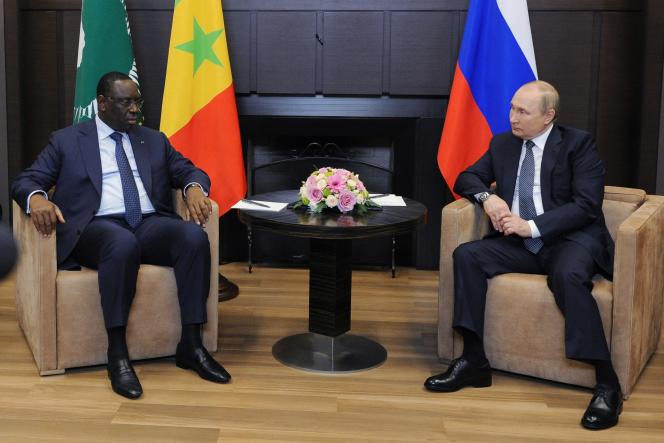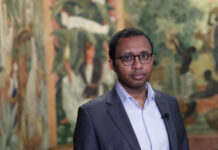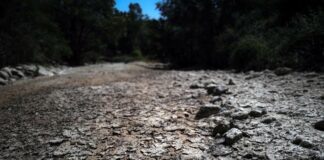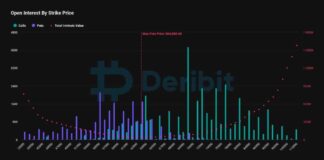There was no agreement, strictly speaking, between Russians and Africans. But, at a minimum, the Senegalese president brought back a lot of promises from his meeting with Vladimir Putin. Macky Sall, President-in-Office of the African Union (AU), went to Sochi, a seaside resort on the shores of a Black Sea, on Friday June 3, partly subject to the bellicose blockade of the Russian Navy, to ask Vladimir Putin “to realize that [African] countries are victims of this economic crisis”.
One hundred days after the start of the war against Ukraine, after three hours of talks with the Russian leader, Macky Sall – accompanied by the chairman of the AU commission, the Chadian Moussa Faki Mahamat – officially left “reassured and very happy with the exchanges”. He found the Russian president “committed and aware that the crisis and the sanctions are creating serious problems for weak economies, such as African economies”. “The sanctions” are those applied against the Russian aggressor by the European Union and the United States – essentially – since the beginning of the war and whose expediency divides the 55 member countries of the African Union.
Most of them, however, bear the brunt of the consequences of this distant war. And there is urgency. Between 2018 and 2020, the African continent imported nearly half of its wheat consumption from Russia and Ukraine. According to figures from the African Development Bank (AfDB), prices for this cereal have risen by around 45% since the start of the year.
To this increase linked to the disruption of supply from these two essential producers who have become belligerent is added, as a collateral effect of the war, the soaring price of energy. It increases the transport costs of any imported good. The height of misfortune for the countries of the Sahel and the Horn of Africa, an unprecedented drought for twenty years is hitting them, slimming livestock to death and reducing harvests to nothing in certain regions.
“Hurricane of Famines”
In mid-March, just three weeks after the start of the Russian offensive, United Nations Secretary General Antonio Guterres sounded the alarm. He said he feared a “hurricane of famines” in the most vulnerable countries – mostly located in Africa. He then feared “the collapse of the global food system”.
Since then, the situation has not improved much. On May 21, in Geneva, Jens Larkey, spokesman for the United Nations Office for the Coordination of Humanitarian Affairs (OCHA), estimated that 7.7 million children under the age of 5 were at risk of suffering from malnutrition in the Sahel. . In total, in this vast sub-Saharan region running from West to East, from Senegal to Somalia, some 18 million people are in a state of acute food insecurity. However, according to the Director General of the World Trade Organization (WTO), Ngozi Okonjo-Iweala, around 25 million tonnes of Ukrainian grain are stored and blocked. Another 25 million tonnes could be harvested in June.
Shortly before his meeting with Vladimir Putin, Macky Sall had seen fit to remind the Russian leader that “the majority of African countries have avoided condemning Russia” in two recent votes at the United Nations. He added that with “Asia, the Middle East as well as Latin America, a good part of humanity” had preferred to stay away from the Ukrainian conflict. He also suggested that Western sanctions may have “caused more seriousness”. “We no longer have access to grain from Russia or fertilizers,” he added.
“A countdown is on”
On Friday, Vladimir Putin would therefore have “reassured” his African interlocutors. “There is no problem exporting grain from Ukraine,” he said after the meeting. He mentioned ways of transporting them from Ukrainian ports, such as Odessa, or others under Russian control, or via central and eastern Europe by river. “We are ready to provide safe passage for boats using these ports, including Ukrainian boats,” he said. Provided, however, that these ports are “cleared” by Ukraine and that part of the Western sanctions are lifted. kyiv says it is ready to accept security corridors, but has expressed concern that Russia will use them to attack Odessa. As for Western sanctions, far from weakening, they are increasing.
Africa is thus caught in this vice, a player considered secondary in a global crisis. In Paris, it is thus considered that the visit of the President of the African Union is “a warning mission on the crisis with drawers which is preparing in Africa”. But that this is not the sign of a continental alignment behind a Russian partner, certainly noisy, but which remains an economic dwarf in Africa. “A countdown is on, adds this source to the French presidency, if Ukrainian cereals are not released, a food crisis will occur this year and if the seeds to come remain blocked, it could be even worse the following year. . »
Has Moscow, engaged in a policy of seduction towards the African continent, heard the plea of Macky Sall and Moussa Faki? “For now, we have no indication of a Russian change, observes our French source, but it will be difficult for Moscow to maintain its narrative on the blocking of Ukrainian wheat exports through the fault of European sanctions. We had a work of consultation with the African leaders upstream, they are not fooled “. Not fooled on this point, and even more aware of the risks of social explosions that this European war poses in their countries while the fighting continues to rage in the Donbass.














